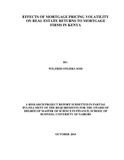| dc.description.abstract | Financing is a very important component of investing in real estate. In general, when
investors desire to obtain financing, they usually pledge, or hypothecate, their ownership
of real estate as a condition for obtaining loans. In Kenya, it is estimated that 234,000
new housing units are required every year yet only 20,000-30,000 units per year are
currently being produced and a mere 20% of these are affordable to low and moderate
income families. The mortgage market in Kenya has increased from 7,600 in 2006 to over
20,000 homes in 2013 but hikes in interest rates has slowed down mortgage uptake. The
prevailing high interest rates as a result of a stringent monetary policy being pursued by CBK
as an effort to fight high inflation has dampened the mortgage market further. The population
of the study comprised all the forty-four commercial banks and one mortgage finance
company registered with the central bank. The study used secondary data collected from the
Central Bank of Kenya, Kenya National Bureau of Statistics and Banks published financial
statements starting 2009 – 2013. The data obtained was analyzed using multiple linear
regression technique. The study established that there existed a positive relationship between
mortgage pricing volatility and real estate returns. Interest rates volatility affects a bank‘s
underlying economic value. The value of a bank‘s assets, liabilities is affected by a
change in rates because the present value of future cash flows. Generally the interest rate
risk is the exposure of a bank‘s financial condition to adverse movements in interest
rates. Accepting this risk is a normal part of banking and can be an important source of
profitability and shareholders‘ value creation. However excessive interest rate risk can
pose a significant threat to a bank‘s earnings and capital base. The study recommends that
commercial banks in Kenya should assess their clients and charge interest rates accordingly,
as ineffective interest rate policy can increase the level of interest rates and consequently
Non-performing Mortgages. Mortgage firms should also apply rigorous policies on loan
advances so as loans are awarded to those with ability to repay and mitigate moral hazards
such as insider lending and information asymmetry. | en_US |

